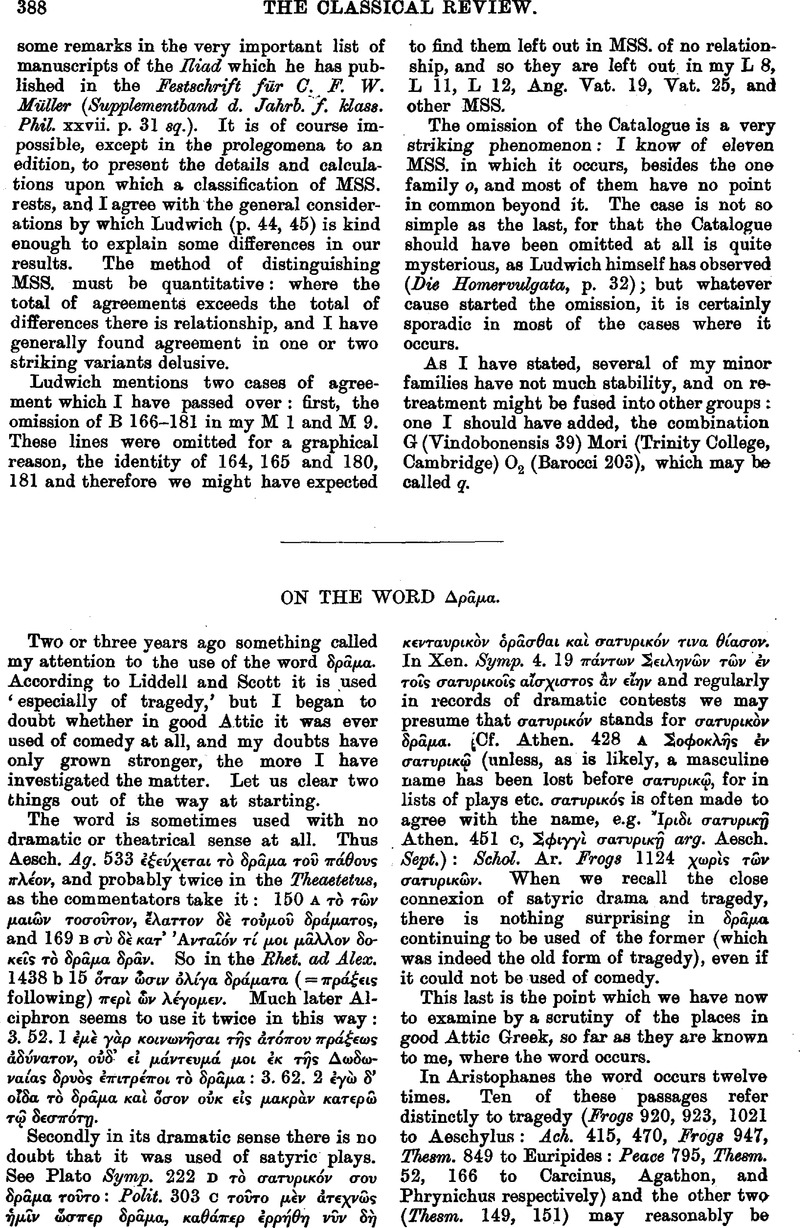No CrossRef data available.
Article contents
Abstract

Information
- Type
- Original Contributions
- Information
- Copyright
- Copyright © The Classical Association 1900
References
page 391 note 1 It is probably only an accident that Aristophanes has no clear instance of the singular τραγδ⋯α in the concrete sense of a tragedy. It occurs in him twelve times (Ach. 400, 412: Eq. 401: Vesp. 1511: Pax 148: Av. 1444: Ran. 95, 798, 862, 913, 1120: Plut. 423), but it may always be abstract, even in Eq. 401 and Pax 146, where we are most tempted to make it concrete. In the Orators the singular is rare, and when it occurs (⋯ν τραγῳδ⋯ᾳ Dem. 18. 127: 21. 149: Aesch. 3. 231) there is no reason why it should not be abstract, in tragedy. Plato seems always to make it abstract, except in the difficult expression Symp. 173 A ![]() , which, has been doubted on other grounds. Otherwise the earliest clear example which I can find is in a fragment of Antiphanes (M. 3. 3: K. 2. 13)
, which, has been doubted on other grounds. Otherwise the earliest clear example which I can find is in a fragment of Antiphanes (M. 3. 3: K. 2. 13) ![]() . The singular κωμᾳδ⋯α, on the other hand, is used in the concrete sense not only by Plato Apol. 19 C
. The singular κωμᾳδ⋯α, on the other hand, is used in the concrete sense not only by Plato Apol. 19 C ![]() , but twice by Aristophanes (Ach. 378
, but twice by Aristophanes (Ach. 378 ![]() : Nub. 534
: Nub. 534 ![]() .
.
The plural τραγᾳδ⋯αι is however used in a concrete sense seven times in Aristophanes, four or five times in Plato, and at least as many more in the Orators. Although therefore the facts rather suggest that to Aristophanes tragedy was τραγᾳδ⋯α, but a tragedy δρ⋯μα, this was probably not the case. It may be added that in the Poetics, though τραγᾳδ⋯α is abstract as a rule and more often perhaps than is usually supposed, there are clear instances, e.g. 14. 1453 b 34, 18. 1456 a 31, 23. 1459 b 3, of the concrete sense.
page 393 note 1 It cannot be a mere accident that the only three examples of δρ⋯ν in Homer occur within a few lines of one another in Od. 15. 317 (![]() ), 324 (παραδρώωσι), and 333 (⋯π∘δρώωσιν) with δρηστ∘σ⋯νη in the same passage at 321. The substantive
), 324 (παραδρώωσι), and 333 (⋯π∘δρώωσιν) with δρηστ∘σ⋯νη in the same passage at 321. The substantive ![]() occurs five times in the Odyssey (10, 349: 16. 248: 18. 76: 19. 845: 20. 160). The Homeric Hymns have no example of δρ⋯ν, though δρησμ∘σ⋯νη is found H. Dem. 476, nor does it apparently occur at all in Hesiod. (The verbal index in Paley's edition and in Flach's—in neither case properly revised from the old Goettling—gives δρ⋯ν as occurring in the Shield 426: this is a clerical error for δρ⋯ν). Pindar too has no δρ⋯ν, though he has δρ⋯στας (Pyth. 4. 287) and Bacchylides has it only once (3. 83 ὅσια δρ⋯ν). The Theognidea have it twice, 108 and 954 (Sitzler's index).
occurs five times in the Odyssey (10, 349: 16. 248: 18. 76: 19. 845: 20. 160). The Homeric Hymns have no example of δρ⋯ν, though δρησμ∘σ⋯νη is found H. Dem. 476, nor does it apparently occur at all in Hesiod. (The verbal index in Paley's edition and in Flach's—in neither case properly revised from the old Goettling—gives δρ⋯ν as occurring in the Shield 426: this is a clerical error for δρ⋯ν). Pindar too has no δρ⋯ν, though he has δρ⋯στας (Pyth. 4. 287) and Bacchylides has it only once (3. 83 ὅσια δρ⋯ν). The Theognidea have it twice, 108 and 954 (Sitzler's index).
page 393 note 2 There is no accurate information as to Isocrates.
page 393 note 3 Sturz' lexicon seems to show that δρ⋯ν occurs in all Xenophon three times only: Hellenics 1. 1. 23, Cyropaedia 3. 3. 53, Hipparchicus 8. 8, of which passages the first is a quotation from the Doric, ![]() . It is a small point in favour of those opera minora which have been doubted, that they do not contain the word.
. It is a small point in favour of those opera minora which have been doubted, that they do not contain the word.

